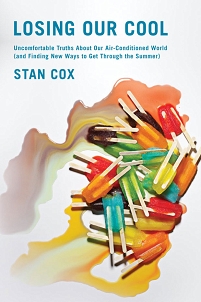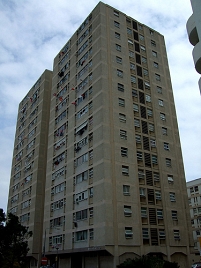Erstellt am: 26. 8. 2010 - 18:29 Uhr
Addicted to Cool
This may be the last really hot day of the year – so let’s hear it for air-conditioning. It’s the novelty that has become a perceived necessity in many societies. Air-conditioning is credited with vastly improving productivity among workers in the Western world over the course of the 20th century, but the idea has been taken to absurd levels. A friend of mine did an internship at an office in Amstetten during a sweltering period in July and she had to wear a thick jumper to bear the artificial cold.

cox
This week I spoke to Stan Cox, author of the book Losing Our Cool: Uncomfortable Truths About Our Air-Conditioned World, who points out that in his country, the USA, air conditioning already takes up 15 per cent of total American energy consumption. And that is a figure that is likely to increase. Daily Beast journalist Heidi Cullen described how temperatures were so sticky on the East Coast this July, that the demand for air conditioning caused overloaded electrical transformers to burst into flames.
If other countries caught up with the North American rate of air-conditioning, the hikes in global energy consumption would be enormous. And who's to say they won't? Cooling units have become a new status symbol in China and in sweltering India air conditioning consumption in 2020 will be 10 times its 2005 level. Air-con is an understandable blessing in the tropics (although why is the Bangkok Sky Train cooled to fridge-like temperatures that make you shiver?) but people think they need air-con to survive the famously cool British summers. Even north lying Moscow has experienced a massive increase in demand for air-conditioning after its punishingly hot summer.
The heat-wave in Russia that killed hundreds, maybe even thousands, of people was an example of the recent bout of extreme weather that many scientists say may be a consequence of climate change. Cox sees a vicious circle here: “As the planet gets warmer we will rely more and more on air-conditioning which will in turn ensure more heat-waves of an even greater intensity and we’ll need even more air conditioning to deal with it.”
The global temperatures are indeed rising. The "best evidence yet" of rising long-term temperatures has just been published and urban areas, concrete jungles that serve as heat-traps, are among the worst affected areas. US climatologist Heidi Cullen has shown that the average July temperatures in many US cities rose by 4 to 5 degrees between 1971 and the year 2000.
So is more air-conditioning inevitable? Well the short answer is yes. Cox criticizes the way that architecture has developed, with the majority of buildings designed to be “totally dependent on energy intensive cooling.” It reminded me off visiting a conference of architects in Accra, Ghana where the visiting dignitary, a foreign ambassador, shocked the delegates by saying: "You just build concrete blocks and stuff them full of air-con." Undiplomatic but true.

flickr.com/yeowatzup kok leng yeo
Cox also says that life in our “air conditioned bubble” has made us less tolerant of heat, both physically and mentally. He echoes the words of Cambridge University anthropologist Gwyn Prins who, 20 years ago, compared our addiction to air-conditioning with “crack-cravings” and wrote that "Once one's body has become addicted to air-conditioned air, one has extended one's range of basic, physiological human needs beyond food, shelter and warmth to an acquired need: Coolth,"
"Embrace the Sweat"
Cox thinks we have to wean ourselves off that addiction – not just for the benefit of the climate, but for our own private benefit. He says in the West we have begun to move our lives increasingly indoors in summer with implications for our social interaction. Adolescents, he points out, are less prone to ride on their bikes in the cooling breeze to a swimming spot and are more likely to play on video consoles in artificially cooled rooms. Cox argues that if we could reduce our dependency on air-conditioning we could create opportunities for “better, healthier and happier lives.” He also thinks we should be more tolerant of our own biological cooling systems - our sweat glands. Don’t be embarrassed - there are worse things in life than a sweaty arm-pit.
Cox doesn’t suggest we go “cold turkey” on A.C. He says we should just reduce our use of it. Imagine a work place without air conditioning: “Business suits are out. And with the right to open a window, office employees no longer have to carry sweaters or space heaters to work in the summer."

flickr.com//lancashire paul lancastrian
He demands that natural temperature regulation is taken into account in architecture for cities that get hot in the summer, suggesting features like “high ceilings, better cross-ventilation, whole-house fans, screened porches, basements and white cool roofs to reflect solar rays.” Visitors to the Mediterranean will agree that we are not talking rocket-science here. Dubai take note – air-conditioned beaches are right out!
12 months after they met under blowing heaters in snowy Copenhagen, delegates will meet for a new UN Climate Summit in balmy Cancun in Mexico.
But will they dare sweat it out?


